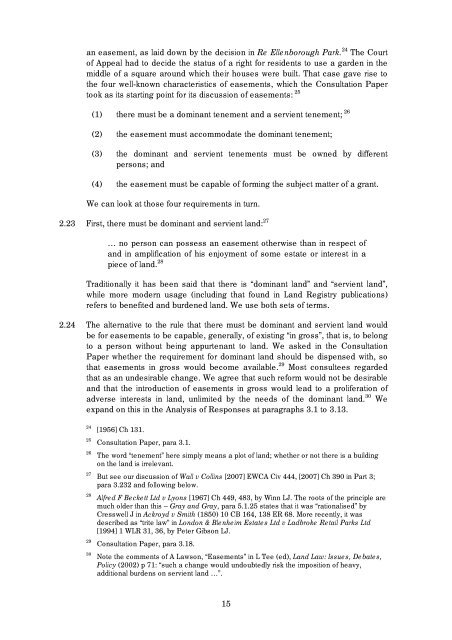Making Land Work: Easements, Covenants and ... - Law Commission
Making Land Work: Easements, Covenants and ... - Law Commission
Making Land Work: Easements, Covenants and ... - Law Commission
Create successful ePaper yourself
Turn your PDF publications into a flip-book with our unique Google optimized e-Paper software.
an easement, as laid down by the decision in Re Ellenborough Park. 24 The Court<br />
of Appeal had to decide the status of a right for residents to use a garden in the<br />
middle of a square around which their houses were built. That case gave rise to<br />
the four well-known characteristics of easements, which the Consultation Paper<br />
took as its starting point for its discussion of easements: 25<br />
(1) there must be a dominant tenement <strong>and</strong> a servient tenement; 26<br />
(2) the easement must accommodate the dominant tenement;<br />
(3) the dominant <strong>and</strong> servient tenements must be owned by different<br />
persons; <strong>and</strong><br />
(4) the easement must be capable of forming the subject matter of a grant.<br />
We can look at those four requirements in turn.<br />
2.23 First, there must be dominant <strong>and</strong> servient l<strong>and</strong>: 27<br />
… no person can possess an easement otherwise than in respect of<br />
<strong>and</strong> in amplification of his enjoyment of some estate or interest in a<br />
piece of l<strong>and</strong>. 28<br />
Traditionally it has been said that there is “dominant l<strong>and</strong>” <strong>and</strong> “servient l<strong>and</strong>”,<br />
while more modern usage (including that found in <strong>L<strong>and</strong></strong> Registry publications)<br />
refers to benefited <strong>and</strong> burdened l<strong>and</strong>. We use both sets of terms.<br />
2.24 The alternative to the rule that there must be dominant <strong>and</strong> servient l<strong>and</strong> would<br />
be for easements to be capable, generally, of existing “in gross”, that is, to belong<br />
to a person without being appurtenant to l<strong>and</strong>. We asked in the Consultation<br />
Paper whether the requirement for dominant l<strong>and</strong> should be dispensed with, so<br />
that easements in gross would become available. 29 Most consultees regarded<br />
that as an undesirable change. We agree that such reform would not be desirable<br />
<strong>and</strong> that the introduction of easements in gross would lead to a proliferation of<br />
adverse interests in l<strong>and</strong>, unlimited by the needs of the dominant l<strong>and</strong>. 30 We<br />
exp<strong>and</strong> on this in the Analysis of Responses at paragraphs 3.1 to 3.13.<br />
24 [1956] Ch 131.<br />
25 Consultation Paper, para 3.1.<br />
26<br />
The word “tenement” here simply means a plot of l<strong>and</strong>; whether or not there is a building<br />
on the l<strong>and</strong> is irrelevant.<br />
27<br />
But see our discussion of Wall v Collins [2007] EWCA Civ 444, [2007] Ch 390 in Part 3;<br />
para 3.232 <strong>and</strong> following below.<br />
28 Alfred F Beckett Ltd v Lyons [1967] Ch 449, 483, by Winn LJ. The roots of the principle are<br />
much older than this – Gray <strong>and</strong> Gray, para 5.1.25 states that it was “rationalised” by<br />
Cresswell J in Ackroyd v Smith (1850) 10 CB 164, 138 ER 68. More recently, it was<br />
described as “trite law” in London & Blenheim Estates Ltd v Ladbroke Retail Parks Ltd<br />
[1994] 1 WLR 31, 36, by Peter Gibson LJ.<br />
29 Consultation Paper, para 3.18.<br />
30 Note the comments of A <strong>Law</strong>son, “<strong>Easements</strong>” in L Tee (ed), <strong>L<strong>and</strong></strong> <strong>Law</strong>: Issues, Debates,<br />
Policy (2002) p 71: “such a change would undoubtedly risk the imposition of heavy,<br />
additional burdens on servient l<strong>and</strong> …”.<br />
15
















